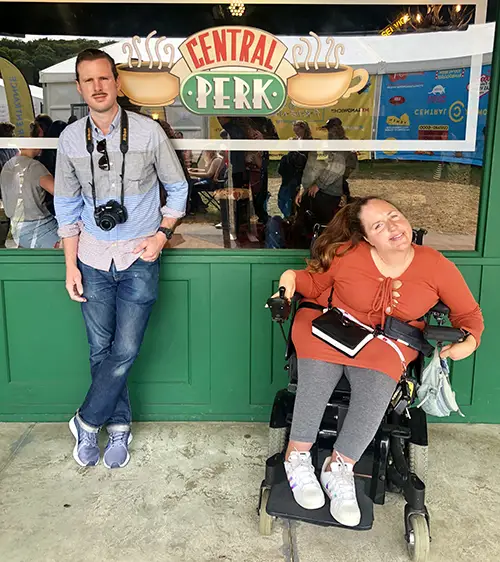
How to employ your own PAs: a practical guide from a personal perspective
There are whole host of things you need to plan and organise when it comes to employing your own carers or personal assistants (PAs). It can sometimes be overwhelming, especially if it is your first time as an employer, but there are steps you can take to make the process run as smoothly as possible.
Georgina Moore, who has Arthrogryposis, explains the process of employing PAs, as well as key contractual and communication aspects that will hopefully make your experience a lot easier.
I was first allocated Direct Payment hours, enabling me to employ a PA, when I was living with my parents around 15 years ago. Prior to that, my parents had always provided the 24-hour care I need. But I wanted more independence.
Friends took on these initial hours, which meant I didn’t have to find PAs, and I stayed living at home.
When I was 32, I finally moved out. It took so long to get to this point, mainly because I was fearful I would never receive the funding I needed. After battling with social services, I was finally awarded the finances to pay for 24-hours of care.
Successfully navigating the funding process is a large topic of its own, so I’ll write another article about that. But I would say now – never give up and gather as much medical evidence as you can.
Recruiting PAs if you have a disability


Working hours
The first decision I had to make was around shift patterns. My PAs hours needed to meet the Working Time Directive, a law that ensures employees don’t work too many hours and get paid holiday. Now that we are no longer in the EU, it is worth taking a look at the UK laws around working hours.
I also wanted their hours to fit in with my lifestyle. I’m active in the daytime so didn’t want PAs changing over shifts during these times.
I quickly realised that I will never have complete freedom, but I was advised that I always have the right to alter shift times to suit my needs.
Finding the right PAs
For advertising, I was advised to use either Gumtree or social media. I also utilised People Plus, an organisation that assists with employing PAs, to create the application form.
I posted an advert on local for-sale Facebook groups with a trimmed-down job description, the location and hourly rate. I asked people to message me if they wanted the full job spec and application form. I could not believe how quickly I was inundated with requests.
It is imperative that you draw up a job specification. It sets out expectations, main duties, and key qualities and skills required.
Interviewing PAs
Next, I needed to narrow down the applications and hold interviews. I selected around half a dozen applicants based on eagerness, experience and flexibility. I held the interviews at my parents’ house so that applicants could see my equipment.
I had a list of questions to ask each applicant so that I could compare answers. I also had someone with me because I didn’t want to miss any information and wanted a second opinion.
No one is perfect and each person had their own strengths. I decided to go with my instinct, and this has never let me down to this day.
Applicants need to be competent, but you should go with your heart. Do you feel a connection? Do you feel at ease or did they make you feel uncomfortable?
Watch out for anyone who talks to the person accompanying you and avoids eye contact with you. It is ignorant and not how someone should behave in front of a disabled person.
Finally, gathering references and completing DBS checks to ensure they don’t have a criminal record should eliminate any concerns.
Organising contracts and training for PAs
For successful applicants, I arranged shifts shadowing my parents. They observed for one shift and then were hands-on. This was crucial to ensure they were confident, and all parties were happy.
Following successful shadowing, applicants signed a Contract of Employment, House Rules and Employee Registration – more on this below.
I then started them working whilst still living with my parents. This meant that once I was ready to move into my adapted flat, my care was already efficient.
I also got my PAs to complete training courses through my local council. This included manual handling, first aid, food hygiene, administration of medication, health and safety and infection control. These are all mandatory for insurance purposes – again, more on this below.
Your local council should provide this if your PAs are funded through them, and you should be able to contact your local council Workforce Development Department for information.
9 essential tips for employing PAs


Maintaining the quality of care of your PAs is essential, so these 9 steps should help you to do so…
1. Contract of Employment
Even with people who are self-employed, you need a signed agreement. I have known people who haven’t had one, and it has meant they have had no control over their employees. PAs could walk out or refuse to do their duties. I would never risk it.
People Plus has templates for this, as well as House Rules and an Employee Registration.
2. Insurance
Getting liability insurance protects you and your PAs. It doesn’t cover self-employed staff, so they must have their own insurance.
3. House rules
This is a list of the contract clauses but expanded upon to give more detail. For example, ‘an employee must seek permission before taking annual leave’ is one clause.
The House Rules would expand on this by adding: employees must check no other PA is off during their request time and then fill out an annual leave request form. They are responsible for finding cover.
House Rules ensure clarity and that employees cannot say they didn’t understand a contract clause.
4. Communications book
This is a book for everyone to write down messages or ideas. I have found the more open staff are, the better things work. It can be difficult when there are tensions or annoyances that aren’t shared.
5. WhatsApp group (or similar)
My team has two WhatsApp groups, which I have found to be really efficient for communication.
One is for general questions, such as, “Does anyone know where [insert object] is?” A response is almost immediate. My employees also have a group that I’m not part of so that they can sort out staff cover or shift swapping.
6. Chores list
My care plan includes household chores. But I didn’t want to dictate what chores each PA does, so I have a laminated list of them that PAs can choose from and tick off. Once everything on the list has been done, the ticks get wiped off and it is started again.
7. Staff meetings
Every three months I have staff meetings. Beforehand, I ask if anyone has issues they want me to address anonymously. I type up the minutes and we go through them as a group, discussing the points.
Meetings can be uncomfortable at times, but once they are done, they tend to clear the air and eradicate tensions.
8. Team socials
Throughout the year and at Christmas we have social events. We’ve even been on a mini cruise! My PAs don’t directly work together, but are still part of a team, so it’s important to keep a good rapport and morale up.
9. Consistency
Be consistent with the rules – you can’t change them for one and not another.
I have had a PA come to me begging for time off when another PA was already off, to the point where they cried. I cannot express how hard it is to say no, but the rules are there for a reason.
If I was left with two PAs to cover 24-hour care there would be safeguarding issues. You must protect yourself first.
Employing PAs: the lessons I’ve learned
Over the last five years, I have learned that employing PAs isn’t easy, but it is definitely worth it.
I have had few staff changes, but this has been down to their personal situations. At the end of the day, it’s a job to them.
From speaking to other disabled people and social workers, I realise that I am either extremely lucky or managing PAs effectively (everyone tells me it’s the latter).
I constantly hear stories of misconducts and it saddens me. I have never had a serious issue. When I explain my strategies, people always seem amazed and intrigued.
Having said that, I still struggle with things. If you do any of the following – don’t beat yourself up.
- Feeling guilty if I want quiet time and not ‘entertaining’ PAs.
- Blaming myself when PAs leave.
- Adjusting my life to make PAs happy.
- Not remembering it’s a PA’s job to enrich my life and they aren’t there doing me a favour.
- Not being strict enough to ensure I get as much privacy as I can in life.
Because the job involves personal care and letting them into your life, feeling comfortable with PAs is a timely process.
You need to keep boundaries, but you can’t help building personal relationships. Life would be incredibly boring if we didn’t like a good chat together!
All PAs don’t need to meet the same specification and employees should respect this. I have PAs who are happy to do gardening and decorating, whereas others may not be but are more comfortable doing domesticated chores.


You may find a PA who has similar hobbies to you, such as films, so you might like to go to the cinema with them. Think about any business, not every employee completes the exact same tasks.
If PAs know what is expected at the start and they agree to it, then they have no right to complain.
Remember PAs are there to facilitate the choices we make. They are not there to dictate or influence our decisions.
If they get fed up with the job role then it should be their responsibility to move on. We should never be made to feel guilty about their duties. It’s our life and we deserve the right to be happy!
If you would like any of the documents I’ve mentioned in my article or some friendly advice, then please do contact me at georgemoore83@gmail.com.
By Georgina Moore
Check out Georgina’s blog From This Window and follow her on Instagram.
More on Disability Horizons…